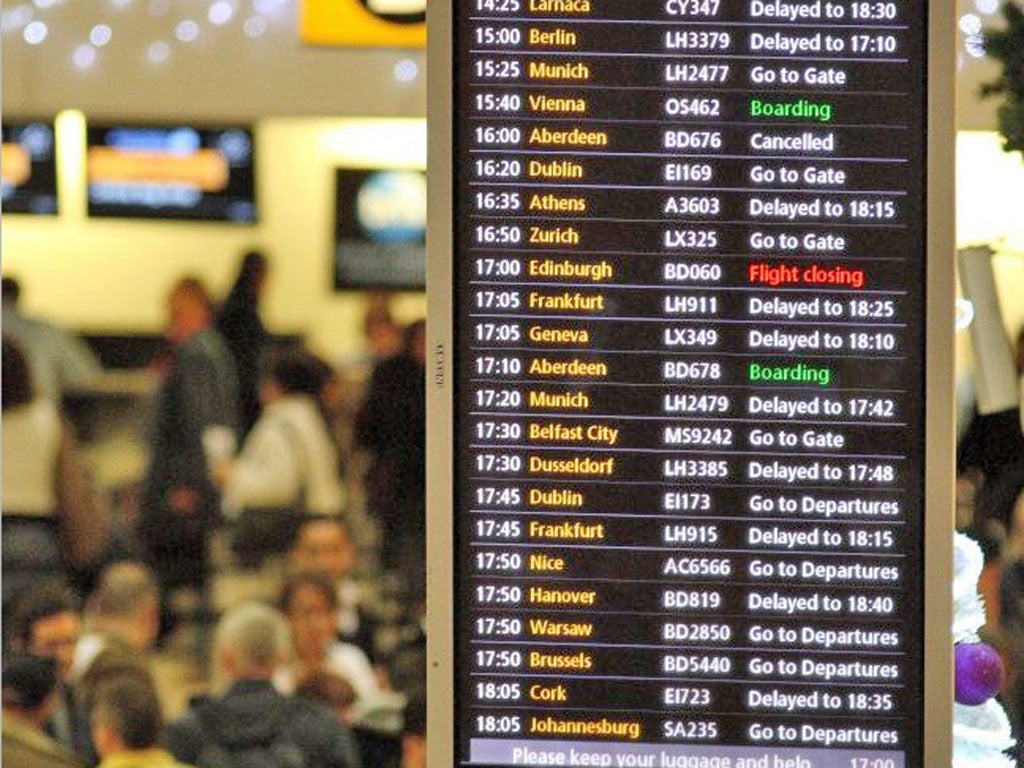Airport bosses claim politicians' dithering is damaging economy
CEOs of Manchester, Dubai and Bristol add to criticism of paralysis in London

Your support helps us to tell the story
From reproductive rights to climate change to Big Tech, The Independent is on the ground when the story is developing. Whether it's investigating the financials of Elon Musk's pro-Trump PAC or producing our latest documentary, 'The A Word', which shines a light on the American women fighting for reproductive rights, we know how important it is to parse out the facts from the messaging.
At such a critical moment in US history, we need reporters on the ground. Your donation allows us to keep sending journalists to speak to both sides of the story.
The Independent is trusted by Americans across the entire political spectrum. And unlike many other quality news outlets, we choose not to lock Americans out of our reporting and analysis with paywalls. We believe quality journalism should be available to everyone, paid for by those who can afford it.
Your support makes all the difference.The bosses of three airports outside South-east England have added their weight to the debate over aviation capacity.
The trio have lambasted the failure by politicians to reach a consensus on airport development in London and across Britain.
The chief executive of Manchester Airports Group, Charlie Cornish, warned: "Lack of certainty increases risks and drives businesses to focus investment opportunities in other countries. Airports are integral to the economic success of the UK and the need for a long-term framework is absolutely critical."
Mr Cornish said the absence of a long-term infrastructure policy was "a key failure of successive governments". Manchester built a second runway 15 years ago, and has recently taken over from Stansted as Britain's third-busiest airport.
Heathrow handles more passengers than any other airport in Europe – around 70 million per year – while Gatwick is the busiest single-runway airport in the world.
The Coalition has ruled out any expansion before the next election, which is expected in May 2015. Sir Howard Davies will investigate a range of options, including extra runways at Heathrow, Gatwick or Stansted, and building an entirely new airport in the Thames Estuary, which is backed by London's Mayor, Boris Johnson.
The Davies report is unlikely to be published until after the election. But Paul Griffiths, chief executive of Dubai Airports, told The Independent that both speed and scale are essential: "Boris Johnson is on the right lines, but we cannot have a situation where it's estuary airport or Heathrow. In my view, it's got to be both – and quickly."
The existing Dubai airport currently handles 60 million passengers a year, 10 million fewer than Heathrow, but is on target to reach 90 million in six years. "We may stretch that to over 100 million," said Mr Griffiths.
Next year, a dedicated A380 terminal opens in Dubai for the home airline, Emirates. Ground is about to be broken on a fourth concourse for foreign carriers.
An entirely new airport is currently handling freight and will be opening soon for passengers.
"By the end of the next decade we believe it will be the main airport in Dubai, with Emirates and the other airlines transferring their operations there," said Mr Griffiths.
Taken as a whole, the UK has far more airport capacity than it needs. Coventry and Plymouth airports have recently closed because of competition from nearby facilities.
Mr Cornish said the Davies Commission must consider greater use of regional airports: "Manchester is well placed to operate as the northern gateway thanks to the existing infrastructure and established, long-haul carriers."
Bristol airport currently handles six million passengers a year, with planning permission to expand to 10 million.
Bristol's chief executive, Robert Sinclair, said government policy should encourage people "to fly from the regions in which they live".
He said politicians are "frustrating our efforts" by failing to invest in regional aviation – and because of the high level of air passenger duty, currently between £13 and £92 per passenger.
"The voice of regional airports is not being sufficiently heard in this debate," he said. "We need better surface access and we certainly need a better taxation regime. The airlines operating from Bristol airport operate on much thinner margins than those from major airports such as Heathrow. Further increases in the level of taxation impact disproportionally on the airlines operating from the region."
Join our commenting forum
Join thought-provoking conversations, follow other Independent readers and see their replies
Comments